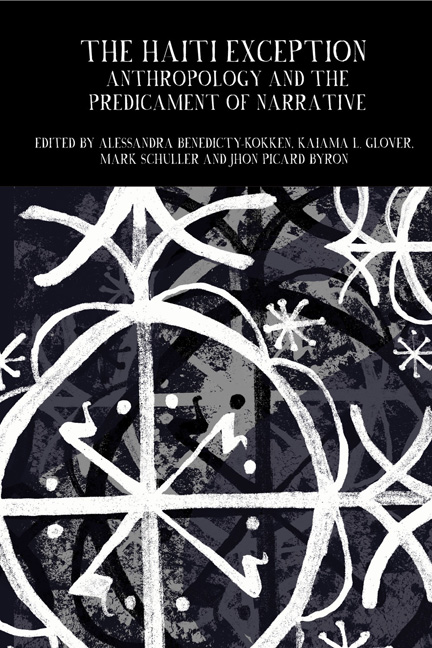Book contents
- Frontmatter
- Contents
- Editors’ Introduction
- I Tracing Intellectual Histories
- II Interrogating the Enquiring Self
- ‘Written with Love’: Intimacy and Relation in Katherine Dunham's Island Possessed
- Dance, Haiti and Lariam Dreams
- ‘Haitian Art’ and Primitivism: Effects, Uses and Beyond
- III On Nation-Building: Histories, Theories, Praxes
- Epilogue: Kalfou Danje: Situating Haitian Studies and My Own Journey within It
- Notes on Contributors
- Index
‘Written with Love’: Intimacy and Relation in Katherine Dunham's Island Possessed
from II - Interrogating the Enquiring Self
- Frontmatter
- Contents
- Editors’ Introduction
- I Tracing Intellectual Histories
- II Interrogating the Enquiring Self
- ‘Written with Love’: Intimacy and Relation in Katherine Dunham's Island Possessed
- Dance, Haiti and Lariam Dreams
- ‘Haitian Art’ and Primitivism: Effects, Uses and Beyond
- III On Nation-Building: Histories, Theories, Praxes
- Epilogue: Kalfou Danje: Situating Haitian Studies and My Own Journey within It
- Notes on Contributors
- Index
Summary
Ah! Who will give me my country
Haiti
You are my only paradise
Haiti
Ah! God reminds me
Your so beautiful forests
Your broad horizons
Far from your shores
The best cage
Is a prison
Yes! My desire, my cry of love
Haiti
I'll be back one day
Oh, beautiful blue country
Far, far away in other skies
I lived happy days
But it's all over
Alone in my exile today
I sing, with wounded heart
Yes! My desire my cry of love
Haiti
I'll be back one day
Haiti!
– ‘Haiti’ (1934) sung by Josephine BakerFrom ‘home’ to Haiti
I first picked up African-American dancer, intellectual and social activist Katherine Dunham's 1969 ethnographic memoir Island Possessed with no ulterior motive, no particular scholarly intent. Having relatively recently earned tenure at my institution, I had decided to grant myself the gift of reading for the pure pleasure of the exercise. I had no plan for the text; I did not see any specific way I would incorporate it into any of the work I was doing (or had promised to do) at the time – those at once heady and oddly disconcerting three months between my promotion and the beginning of the fall term. I was fairly certain, of course, that the book would fall at least to some extent within the scope of my ‘professional purview’ as a Caribbeanist with a particular interest in Haiti. Written by Dunham during the 1960s at her home in Senegal, and based on fieldwork conducted in Haiti in the mid-1930s, there was no question but that the narrative would be a ‘fit’ within the intellectual collage I had been building over the course of my academic career to that point. But again, I had picked up Island Possessed without any expectations regarding its usefulness to my scholarly work. I was simply curious to know something about Dunham's story. Acting on this curiosity felt like an indulgence in that moment.
This wasn't the first time that, out of curiosity and with some time on my hands, I had traced the path of an intentionally lone, perpetually expatriated black woman across the Atlantic. There was some precedent for this.
- Type
- Chapter
- Information
- The Haiti ExceptionAnthropology and the Predicament of Narrative, pp. 93 - 109Publisher: Liverpool University PressPrint publication year: 2016



